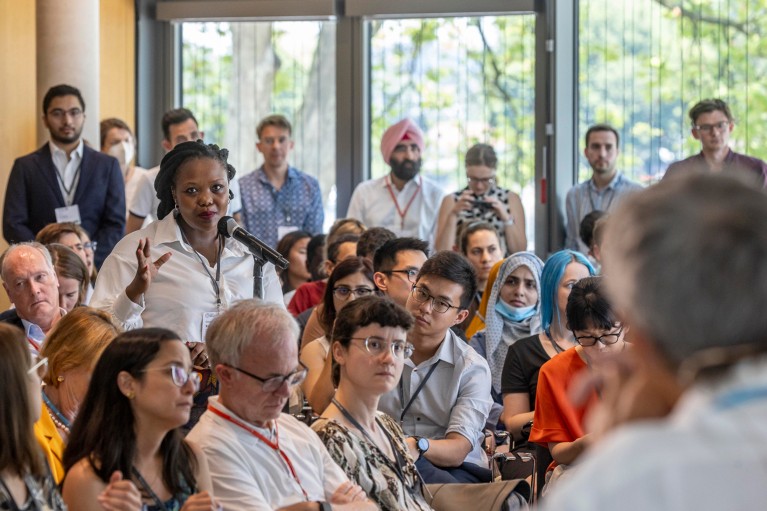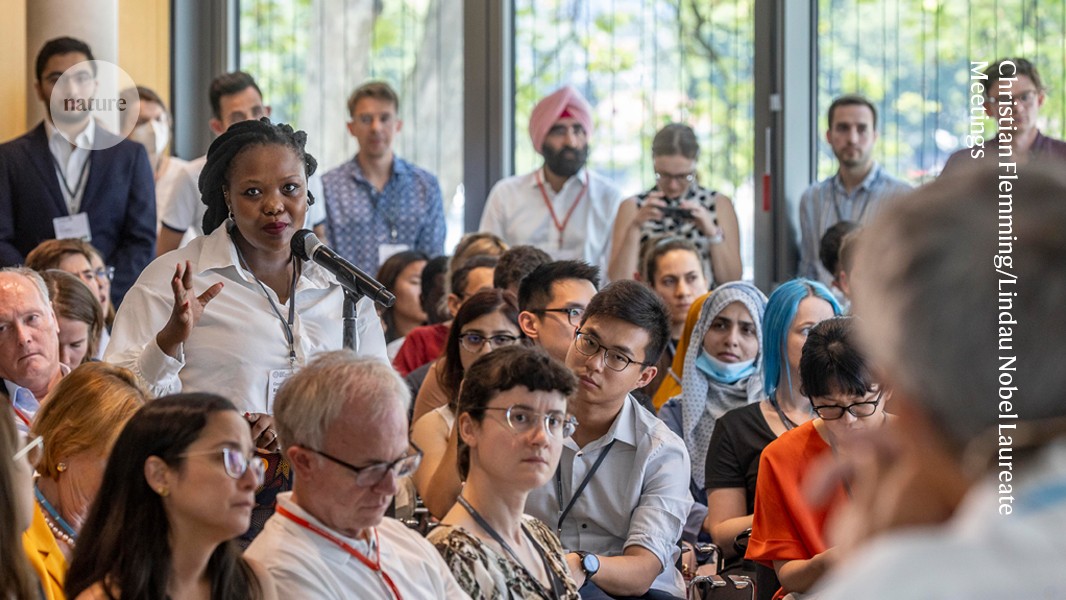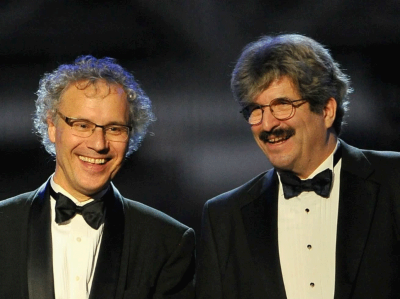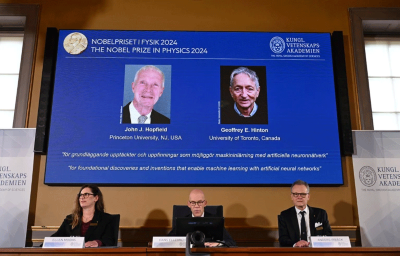
The annual Lindau conferences (pictured) introduce early-career scientists to Nobel prizewinners.Credit: Christian Flemming/Lindau Nobel Laureate Meetings
It’s Nobel Prize week, and history indicates that the scientists in with the best chance of winning are men from Europe or North America. If you were born anywhere else in the world, your best chance of getting an invitation to Stockholm is to find a research job in a North American or European country and relocate.
Thus concludes a Nature Feature published last week called ‘How to win a Nobel prize’. The analysis also notes that prizewinning science is often performed by teams that share ‘family’ links with previous winners (R. S. J. Tol Scientometrics 129, 1329–1346; 2024).
How to win a Nobel prize: what kind of scientist scoops medals?
Representatives of the organizations that select the Nobel prizewinners have told Nature that they are continuously working to better recognize diversity in science. And there has been noticeable movement. In the entirety of the twentieth century, only 11 Nobel prizes in chemistry, physics, or physiology or medicine were awarded to women. Between 2000 and 2023, 15 women received awards (not all of this year’s prizes had been announced by the time Nature went to press).
Throughout Nobel history, only ten prizewinners have been born in countries currently classified by the World Bank as low- or lower-middle-income countries, and most had moved to North America or Europe by the time they received the award. Some might view that as simply reflecting the continuing reality of where the balance of power — and funding — lies in science. But the starkness of the numbers raises the question of how the Nobel prizes — and, by extension, other high-profile international prizes — can capture the depth and diversity of world science as it is today.
China is a case in point. Today, the country hosts seven of the world’s top ten institutions as ranked by their contributions to natural- and health-sciences journals tracked by the Nature Index database. So far, only ten Chinese-born or Chinese-heritage scientists have won a science Nobel prize.
One continuing barrier is the invitation-only nominations process. According to the Statutes of the Nobel Foundation, individuals from named categories can nominate recipients without needing permission to do so. These include: previous winners, professors at universities in Sweden, Denmark, Finland, Iceland and Norway, members of the Royal Swedish Academy of Sciences and members of the relevant Nobel awarding committees. Most others need an official letter inviting them to nominate.
Medicine Nobel awarded for gene-regulating ‘microRNAs’
Thomas Perlmann, a molecular biologist at the Karolinska Institute in Stockholm and secretary of the Nobel Committee for Physiology or Medicine, told Nature: “We are extending invitations to an increasing number of individuals from regions beyond traditional academic research hubs in the United States, Europe, Australia and Japan. Moreover, we’re actively identifying more women and younger scientists as nominators.” The nominations process has two stages: university professors, deans and senior leaders are sent letters asking for the names of scientists who could be eligible to nominate potential prizewinners; selected scientists are then asked for their nominations.
The Royal Swedish Academy of Sciences in Stockholm selects the Nobel laureates in chemistry and physics, and the physiology or medicine prize is awarded by the Karolinska Institute. Peter Brzezinski, a biochemist at Stockholm University and secretary of the chemistry committee, says that the academy has identified around 1,250 universities to write to. Because of a lack of capacity, each will receive, on average, an invitation only every five years.
Network providers
If the Nobel organizations are to write to larger numbers of people, they will need to increase their capacity for the task — or accept offers of assistance from elsewhere. Over the years, international scientific networks that have access to a large and diverse pool of names of potential nominators have told Nature that they would be willing to help. These include the African Academy of Sciences, based in Nairobi; the InterAcademy Partnership, a network of the world’s science academies; the International Science Council, which represents more than 250 scientific unions, associations and other bodies; and the World Academy of Sciences (TWAS). TWAS is a fellowship network for leading scientists that was established in 1983 by a group of researchers led by the late Pakistani physicist and Nobel laureate Abdus Salam. The current TWAS president, Quarraisha Abdool Karim, says that the organization’s 1,400 fellows, most of whom are based at universities in low- and middle-income countries (LMICs), are well placed to suggest people to nominate. They only need to be asked.
Physics Nobel scooped by machine-learning pioneers
As Daniel Schaffer wrote in his book TWAS at 20 (2005), there were two options for many researchers from LMICs when the academy was founded four decades ago: “Focus on your career and turn your back on your home; or stay home and sacrifice your career.” Today, as Abdool Karim says, excellence is everywhere as science continues to grow and flourish beyond its previous centres of power.
There is no doubt that the Nobel-awarding organizations are aware of what needs to be done and the scale of the task involved in continuing to broaden the pool of prize nominees. Change will take time. Many laureates have waited decades for their work to be recognized, although a long time lag is not a given; some have been rewarded within a few years of their prizewinning discoveries. The organizations that award the Nobels should accept the offers of help to identify people eligible to nominate. It is one thing to have a prize that is not a reflection of the world; quite another for it not to reflect the world of science.





